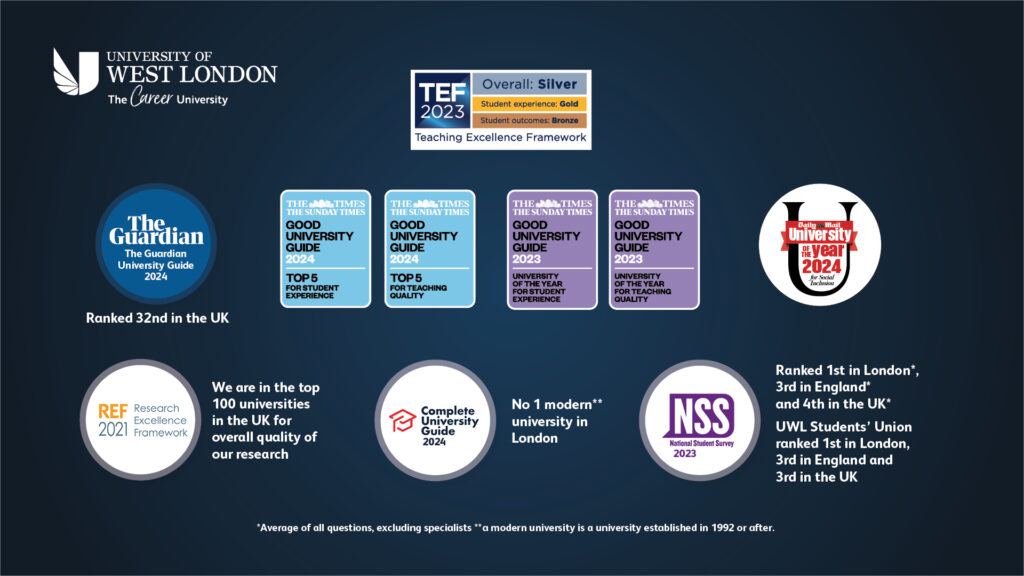UWL LLB (Hons)
Law
(3 Years)

Course Objectives
As students work towards attaining their LLB degree, they will develop a thorough understanding of the complexities of the legal system. They also develop key skills to help them navigate their new career.
We aim to give students a well-rounded education in all aspects of the law, so they will experience:
- close interaction with teaching staff
- learning support as an integral element of modules
- focus on employability skills, including presenting, mooting, advocacy, and research
- ln addition, they will have the chance to learn from the wisdom and experience of leading guest speakers, including academics, barristers, judges and solicitors. Their expertise will raise students’ awareness of how the law operates in the real world.
Study & Career Progression
- barrister
- chartered legal executive (England and Wales)
- paralegal
- solicitor
Facts and achievements
Strategic Partners
- Guest Lecturing
- Material to students/lecturers
- Awards for Top-Performing students
- Internship and Work Opportunities
- Consulting Projects
Year 1
1. Concepts and Foundations of Criminal Law and Offences against Persons
2. Constitutional Law
3. English Legal System
4. Contract Law
5. Criminal Law – Fraud and Crimes Against Property and Defences
6. Public Law
Year 2
1. European Union Law
2. Property Law
3. Tort Law
4. Equity and Trusts
5. Land Law
6. Mooting and Advocacy Skills
Year 3
1. Company Law
2. Employment Law
3. Intellectual Property Law
4. Civil Litigation and Practice
5. Commercial and Consumer Law
6. International Human Rights Law
Module Aims
Year 1
The aims of the module are as follows:
– Understand what a constitution is and why it is necessary
– Understand the key characteristics of constitutions
– Understand the importance of constitutional principles
– Develop an understanding of the different sources of constitutional law
– Develop an understanding of the constitutional sources of the powers available to different governing
The aims of the module are as follows:
– Understand the basic structure of the English Legal System
– Understand the different sources of law within the English Legal System
– Understand the various roles performed by key institutions and people within the English Legal System
– Develop an understanding of the criminal trial process, including the roles of the police and judges with respect to sentencing
The aims of the module are as follows:
– Understand the main institutions involved in government
– Understand the linkage between constitutional law and administrative law
– Understand the sources of public law
– Develop an understanding of the main principles of public law such as the rule of law (including the principle of legality and due process), the separation of powers, Parliamentary sovereignty, Parliamentary accountability of the Executive, representative democracy and responsible government
– Develop an understanding of the key mechanisms available under administrative justice
– Develop an understanding of Judicial Review
– the various hurdles, the procedure and the grounds for Judicial Review
Year 2
The aims of the module are as follows:
– Understand the basic structure of the European Union
– Develop an understanding of the sources of law in Europe
– Understand the various roles performed by key law-making institutions in Europe
– Understand the key principles of EU law, including supremacy, direct effect, indirect effect and state liability
– Understand the Court of Justice of the EU and references under Art 267 TFEU
– Understand EU law relating to freedom of movement of goods and of workers
– equip students with appropriate and relevant substantive and contextual knowledge of the rules, principles and policy factors underpinning the development and application of Tort Law in England and Wales;
– enable students to conduct research using appropriate information technology (IT), including statistics and other numerical data, in order to resolve problems caused by breaches of Tort related obligations and to maintain and update their expertise;
– help students to develop an understanding of how interpersonal interests are affected and protected by the Law of Torts; and
– facilitate the active development of skills in order to be able to make use of the process by which disputes involving Tort law are resolved.
It provides students with a knowledge and understanding of the trust mechanism and the rules which apply to its creation and operation. This module enables students to identify and analyse the different types of trust, examining the distinctions between express and implied trusts and the circumstances in which are expressly created and the circumstances in which implied trusts arise, together with the importance of such trusts and their application.
Students will be provided with opportunities to become familiar with a range of legal research skills and drafting skills in the context of advocacy and mooting.
Year 3
This module develops a critical understanding of the legal framework in which modern companies operate and in particular it examines the nature, formation, constitution, capital structure, internal affairs, management and insolvency of different companies in the context of modern business practice.
The first aim of this module is to enable students to understand certain key aspects of employment law, including the employment protection given to individuals and what remedies are available if these provisions are not complied with. The second aim of the module is to build on the knowledge of contract law which students have studied at level one and to apply this knowledge in a practical context. The final aim of the module is to further develop the problem-solving techniques, including the identification and application of relevant law, which students have been introduced to whilst studying modules at levels 4 and 5.
This module will look at key aspects of the
function, practical context and principles involved
in employment law. It will primarily focus on
the major areas of individual employment law
including wrongful dismissal, unfair dismissal
and discrimination. The module will build on the
knowledge of contract law, which all students
will have, whilst also showing them one area of
UK law where the impact of Employment Law is
substantial and continuing.
This Module Study Guide has been designed to
guide students studying the Intellectual Property Law module as part of the LL.B. The module will introduce students to the key areas in the law relating to Intellectual Property, including copyright, patents and trademarks
– To enable students to understand the most
common actions and procedures in civil litigation and practice (i.e. it provides context to the law already studied on the degree and complements the study of law, process and procedure covered in other modules on the LLB such as Contract
Law, and Tort).
– To enable students to understand the way in
which the law and procedure underpins legal
practice.
– To encourage critical awareness of the
development of the legal system and its
changing nature.
– To further develop students’ problem-solving techniques including identifi cation of the relevant legal issues and procedures.
– To further develop students’ legal skills such as
interviewing, drafting, writing, advocacy and
negotiation.
– Students that undertake this will be encouraged
to participate in the Community Advice Project
run by the School of Law and Criminology.
The object of this module is to introduce students to the law relating to commercial and consumer law, an area which affects us all. The aim of this module is to enable students to fully understand and contextualise the legal principles relating to selected commercial and consumer transactions and how these impact on businesses and consumers.
This module will explore how human rights theory has developed (both up to and since) the United Nations Declaration of Human Rights. The expansion of rights-based arguments from Thomas Paine through to contemporary theory will be discussed, as well as the expansion in the international law of rights such as the International Covenant on Economic, Social and Cultural Rights (ICESCR), and other international human rights treaties. Further issues include the rights of indigenous peoples and issues around global development and social justice. By the end of the module, you will have explored the specific philosophical and theoretical literature on human rights and have acquired an understanding of the historical development of rights-based arguments. You will have learned to evaluate a broad range of issues and contexts related to the national, regional and international human rights doctrines, their tensions and their application, to contextualise the issues of politics and morality to a given human rights question.
Assessment
Year 1
Concepts and Foundations of Criminal Law and
Offences against Persons
Assignment 50%,
Assignment 50%
Constitutional Law
In-class test 50%,
In-class test 50%
English Legal System
In-class test 50%,
In-class test 50%
Contract Law
Assignment 50%,
In-class test 50%
Criminal Law – Fraud and Crimes Against Property and Defences
Assignment 50%,
Assignment 50%
Public Law
In-class test 50%,
In-class test 50%
Year 2
European Union Law
Assignment 50%,
Exam 50%
Property Law
In-class test 50%,
Assignment 50%
Tort Law
Assignment 50%,
In-class test 50%
Equity and Trusts
Assignment 50%,
Assignment 50%
Land Law
In-class test 50%,
Exam 50%
Mooting and Advocacy Skills
Oral Assignment 35%,
Written Assignment 15%,
Oral Assignment 50%
Year 3
Company Law
Assignment 50%,
Exam 50%
Employment Law
Assignment 50%,
Exam 50%
Intellectual Property Law
Assignment 50%,
Exam 50%
Civil Litigation and Practice
Assignment 50%,
Exam 50%
Commercial and Consumer Law
Assignment 50%,
Exam 50%
International Human Rights Law
Oral Assignment 40%, Exam 60%.
- University of the Year for Student Experience and University of the Year for Teaching Qualityin The Times and Sunday Times Good University Guide 2023
- Number 32 out of 121 universities nationwide in The Guardian University Guide 2024.
- Ranked 1st in London, 3rd in England and 4th in the UK in the National Student Survey 2023*.
- University of the Year for Social Inclusion in the Daily Mail University Guide 2024
- Employability – Our career-focused courses will allow to immerse yourself in your chosen career before you even graduate.
- Diversity – We have one of the most diverse student populations in the country.
*Average of all questions, excluding Specialists

Admission Requirements
- Recognised Secondary School Leaving Certificate with minimum grade 15/20
- English competency e.g. IELTS 5.5, GCSE C or equivalent qualification or 15/20 in the English subject of the High School Leaving Certificate or equivalent

Duration
3 years

Accreditation
Recognised by UK NARIC and KYSATS.

